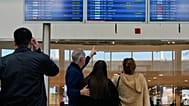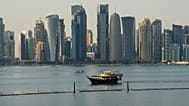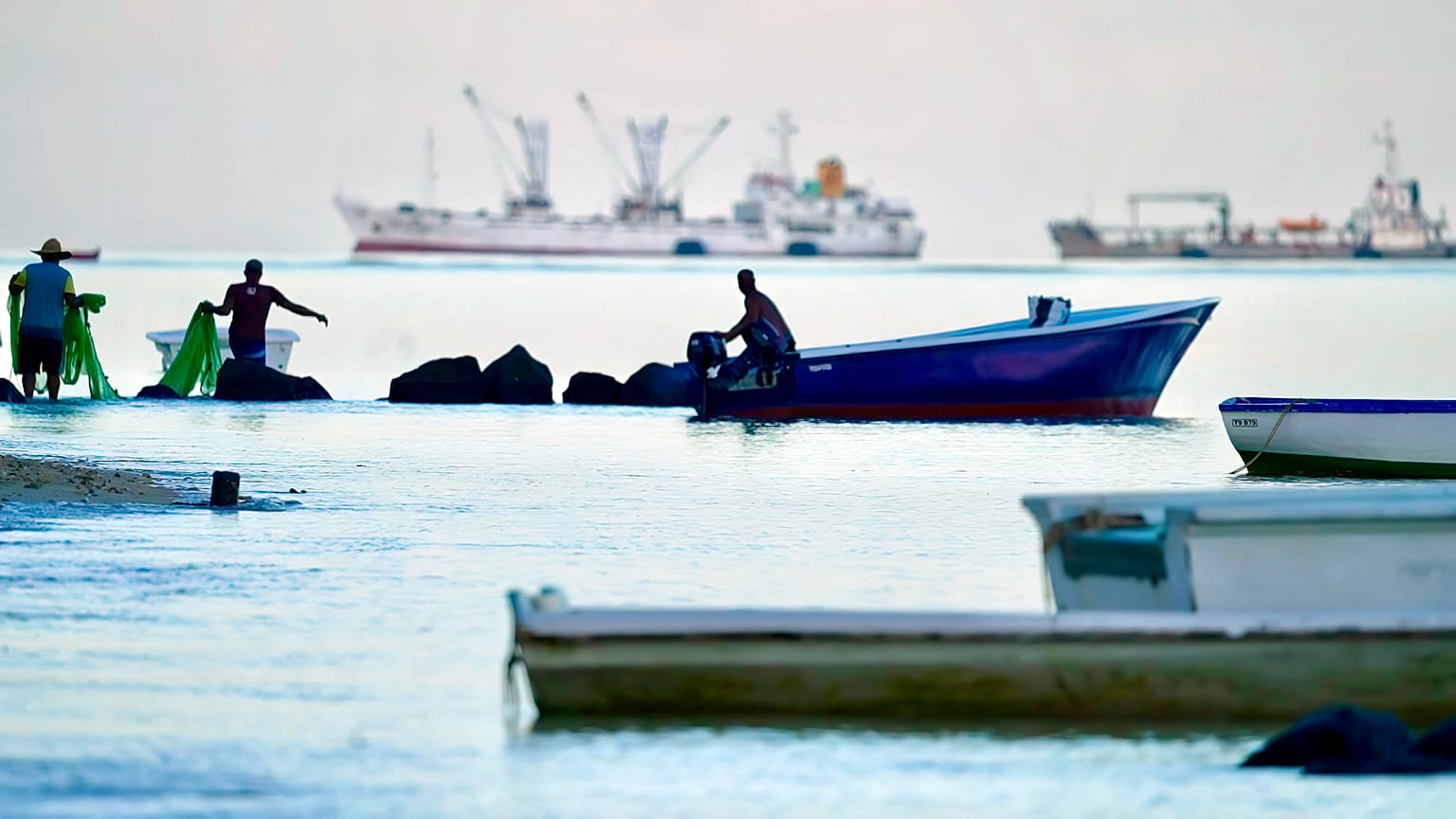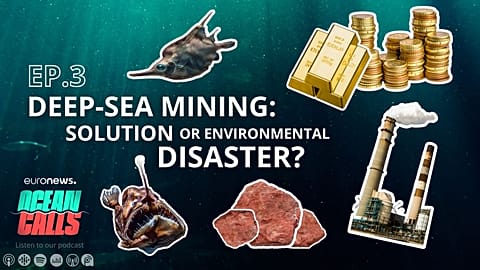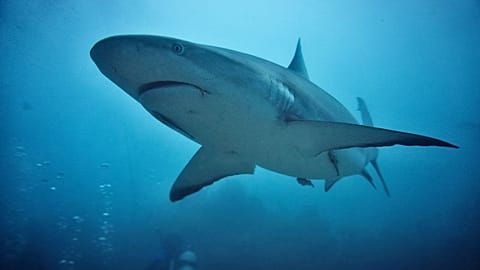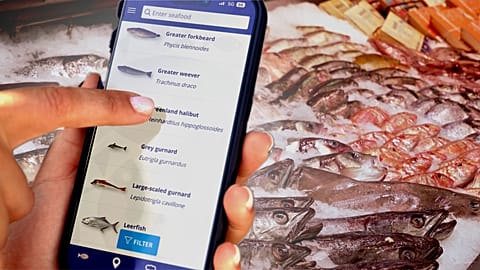The ample fish stocks of the Western Indian Ocean provide livelihoods to coastal communities. But this hard-to-control area has become a hotspot for illegal fishing that's now endangering the marine ecosystem.
In Seychelles, an archipelago nation in the southwest Indian Ocean, fishing is the main source of food and income for many small communities like La Retraite on the island of Mahé.
 ADVERTISEMENT
ADVERTISEMENT
 ADVERTISEMENT
ADVERTISEMENT
Improvement in local facilities
Every afternoon, local fishers return with their catches to sell them fresh at their new marketplace.
This clean and well-equipped facility was built thanks to agreements the European Union has been making with countries like Seychelles - which allow EU vessels to fish in their territorial waters, in return for support given to the fishing sector.
Dimitri Maiden, the chair of the fishermen's association says the new facilities have improved hygiene standards.
"We didn't have any fish market," he says. "So nothing was covered. There were no water facilities. Before this, we were selling fish on wooden pallets over the gutter.
"Most of the fish is going to small hotels. So we don't want to go down the line where hygiene is a problem and people are getting sick."
Catches are declining
But it's not all good news: over the years, catches have been declining. The association urges fishermen to think ahead and work within sustainable limits.
But a much bigger problem is illegal fleets that come from afar - without authorization - to plunder these waters.
Illegal fishing throws marine ecosystems off balance, putting the health of the Western Indian Ocean at risk. But it also endangers regional economies, wiping out jobs and undermining food security in coastal states.
20% of the world's tuna catches come from this region and the resource attracts poachers.
Joint patrols
So how can nations control and protect their exclusive economic zones? One solution is joint patrols.
"Osiris II" used to be a Mauritian longliner until it was seized for illegal fishing and turned into a patrol ship.
Its inspectors come from the nations of the region.
"The objective is to monitor fishing vessels," says the ship's captain, Pascal Briand. "That means checks on the cargo, the staff, any transhipments that might have been done out at sea, checks on the species caught…"
Each patrol team spends a month at sea, checking vessels in several exclusive economic zones — including the European ships present here.
This initiative by the Indian Ocean Commission is supported by the EU's ECOFISH program, which recently granted over 2 million euros to fund further sea and air patrols.
The fish Europe imports from this region must be caught in a legal and sustainable way.
"A lot of boats fish in this area without a licence or the right equipment," says Cédric de Blois, captain of the Avel Vad tuna fishing vessel. "We try to fish according to strict rules."
Such joint patrols seem to have been an effective deterrent. Authorities say fishermen are more inclined to follow the rules now — and over the 15 years since patrols began, serious offences have declined.
But rule-breakers do still get caught.
"If it's a small offence, there'll be just a fine," says fishery inspector Romain Pouvreau. "In the case of an illicit, illegal boat, we can end up taking it to port, for more thorough checks on land."
Port controls
Port controls are also being strengthened, with more fishery officers going through enhanced training programs.
Back in Seychelles, fishing vessels are routinely inspected as they land their catches at the port of the capital Victoria.
Boats that fish without proper licences generally keep clear of local ports — unless they've been intercepted and brought in.
The Euronews crew were shown several small Indian-flagged fishing boats arrested in the port of Victoria. Five have been seized for illegal fishing in just one week.
Some of the resources for these operations come from the Sustainable Fishery Partnership Agreements with the European Union.
"It costs a lot of money to have satellite monitoring," says Johnny Louys, Head of Department, Monitoring Control and Surveillance at the Seychelles Fishing Authority. "Patrol boats at sea, you know, aerial support. So the SFPA has really alleviated the burden on the government to have these things in place.
"That in return has resulted in, for example, the successful apprehension of boats, improved governance in fisheries. We are doing a lot of projects to have electronic systems on board our own fleets."
At the Fisheries monitoring centre in Victoria, officers now have access to some of the latest technologies to observe fishing vessels at sea — including an electronic monitoring system, or EMS.
Onboard video cameras film the entire fishing trip — and captains are aware that any infraction will be recorded.
"When the vessel comes back to port, we remove the hard drive," says Roddy Allisop, Head of the Seychelles Fisheries Monitoring Centre. "We put it in our system, and we monitor the fishing activities. If there's a mammal in the net, we can identify it, and if they are discarding any sharks, if they're discarding any bycatch as well, we can see it there."
Streamlining operations
To the south of Seychelles, Mauritius, another archipelago nation in the southwest Indian Ocean, has a vast exclusive economic zone that covers over 2 million square kilometres of sea: a thousand times its land area.
At the local Fishery control centre, officers usually work with paper logbooks collected from fishing vessels.
The written coordinates must be coherent with data provided by a satellite surveillance system.
Comparing notes manually is slow and cumbersome, so Mauritius is implementing a new technology: electronic logbooks.
"All paper logbooks are hand-filled by the captain, and all the handwritings differ," says Divambal Lutchmanen, Scientific officer of the Fisheries Monitoring Centre at the Mauritius Ministry of Fisheries. "So when we are verifying here, it's quite difficult to see which numbers it is. Now with the ERS, the electronic reporting system, this will be a bit easier.
Enhanced traceability
Last but not least, the EU's Sustainable Fishery Partnership Agreements involve traceability.
Europe imports more than 6 million tons of fish every year. Their origins must be fully transparent — not just in the interests of food safety, but also to combat illegal fishing and the mislabelling of seafood products.
As a result, businesses in the tuna value chain, such as the Port Louis cold-storage company "Froid des Mascareignes" — have introduced systems that let end consumers trace their tuna back to the vessel that caught it.
"Since we put in place this comprehensive system, from landing to cold storage, everyone has complete visibility on what we're doing in real-time," says operations manager Eddy Mootoosamy. "We're protecting the customers' interest — in that they get full traceability right the way to their plate."
No single country can tackle ocean governance alone. Both small coastal communities and industrials depend on healthy seas — that can only be preserved by working together.

